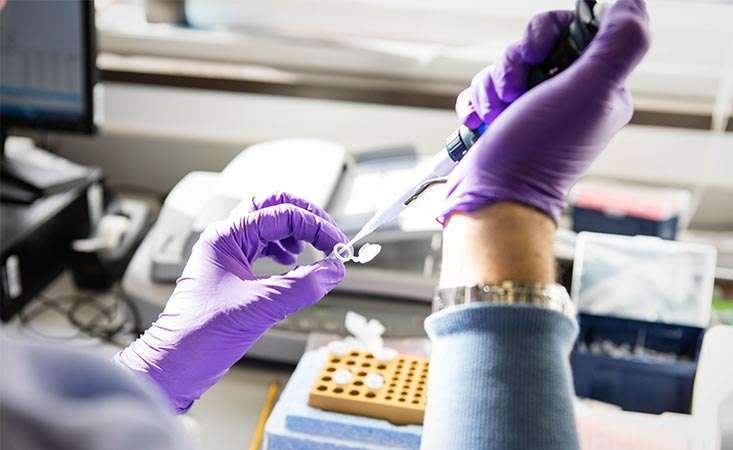
Research efforts are underway to discover more pancreatic cancer biomarkers.
A biomarker is a substance found in the body that can be measured. The amount of a biomarker may vary between a healthy individual and someone with a disease. This means biomarkers can potentially aid in diagnosing that disease, monitoring disease progression and even providing clues about the most effective treatment options for a patient.
Biomarkers may be found in samples of blood, tissue (from a biopsy), urine, saliva or other substances in the body. And biomarkers can be proteins, pieces of DNA, sugars or other molecules.
Biomarkers for Early Detection
There are currently no proven biomarkers that can improve early detection of pancreatic cancer. However, researchers across the country and the world – including Pancreatic Cancer Action Network (PanCAN) research grant recipients – are striving to discover biomarkers that could indicate a person may have undiagnosed pancreatic cancer.
Many of the projects aimed at finding biomarkers to detect pancreatic cancer earlier focus on blood samples, comparing blood from patients who have the disease to healthy individuals. The critical next step to these projects will be to determine whether biomarkers are detectable in people before they’re diagnosed with pancreatic cancer through other methods.
Being diagnosed with pancreatic cancer in its earlier stages allows patients more treatment options and increased access to surgery, which can improve patient outcomes.
Biomarkers to Monitor Disease Progression
Biomarkers can also provide valuable information about whether or not a patient is responding to their pancreatic cancer treatment. An example is carbohydrate antigen (CA) 19-9, a type of antigen (a substance that causes an immune response) released by pancreatic cancer cells.
After patients are diagnosed with pancreatic cancer through other methods, the healthcare team usually takes a “baseline” (initial) measurement of CA 19-9, through a blood test. Then, the levels can continue to be measured while the patient is undergoing treatment, and after treatment is complete. Changes in CA 19-9 levels help doctors see if the tumor is growing, staying the same or getting smaller.
Additional research efforts are underway to identify even more effective biomarkers to indicate whether a patient’s tumor size is changing and whether their disease is progressing.
Biomarkers to Guide Precision Medicine Therapy
Every pancreatic tumor is different. PanCAN strongly recommends molecular profiling of your tumor to help determine the best treatment options.
Molecular profiling reveals a patient’s tumor’s biology (including biomarkers), such as genes and proteins present within their tumor. Some types of treatment are especially effective in patients whose tumors have certain biomarkers. Basing a patient’s treatment options on their tumor’s biological characteristics is known as precision medicine.
Treatments based on your tumor’s biology may increase their success. These may be standard treatments, clinical trials or off-label treatments (treatments that are FDA-approved to treat another cancer, not pancreatic cancer).
Molecular profiling can be available to patients through their treatment institution or through PanCAN’s Know Your Tumor® precision medicine service. Know Your Tumor gives you and your healthcare team treatment information personalized to you.
As scientists and clinicians continue to learn about the biological characteristics of pancreatic cancer cells, more biomarkers will be discovered that can potentially improve early detection, better monitor disease progression and lead to more effective, personalized treatment options.





